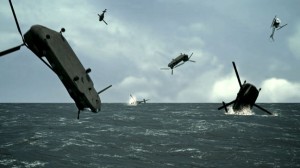
For fun and because I found his post provocative, I thought I’d answer the six sets of questions Thom Donovan provided in “For an Archive of the Future Anterior.” You, too, can play along at home. I chose a musical example, but it also works well with poetry.
“1. Is there a particular historical moment or configuration that, though it is past, still holds conditions of possibility for the future? Such moments can include events of revolutionary participation and/or insurrection, as well as movements for socio-political progress. They might also indicate historical conditions which never ‘amounted’ to anything; which is to say, never culminated in a visible and/or legible result.”
Early to mid-’80s African American electro music: Afrika Bambaataa and the Soul Sonic Force’s “Planet Rock,” of course; but also the Jonzun Crew, Planet Patrol, Newcleus, Royal Cash, Captain Rock, and, slightly earlier, Zapp—and before all of these groups, Sun Ra and P-Funk. How to be an exile in your “own” land while both critically embracing that condition and dreaming of a better place.
“2. Some notions of utopia are placed in the irretrievable or non-existent past (myth) while others are placed in the distant future (sci fi fantasy). Either way utopia, as an idea, is set in dialectical opposition to notions of ‘reality’ and ‘present’. It may be argued that the tension between that which is present and that which is possible creates a vector of becoming. Do you feel that such ideas of utopia are still useful in producing social and political movement?”
The idea of utopia is useful only to the extent that its literal translation is “no place.” One cutting edge of current progressive politics emphasizes no demands and the whatever. And while there’s also a privilege inherent in not needing to demand anything, this politics provisionally opens a radically utopian—again, in the literal sense of the word—space. “Space is the place,” according to both Sun Ra and Newcleus. What are the demands embedded in electro/electro-funk/electro-boogie? Yet it arose out of a profound dissatisfaction with prevailing conditions in the United States.
“3. If advertising and most mass media function by producing and then mobilizing our desires, how do we separate our notions of past and future from those given to us by hegemonic forces (forces of commodity, sovereignty, corporate interest)? Is there a relative autonomy that we are able to exercise within the tense of the future anterior to confront and examine these forces and produce new sensibilities that are outside or in opposition to them? What might it mean to confront the memory traces of past cultural products through their unrecognized and/or abandoned potential?”
Hegemonic forces are not outside of us any more than we are outside of them. Any progressive politics should first and foremost begin with its own complicities with power, and go from there. Electro is an excellent example of incorporating and then subverting technological, cultural, and informational hegemonies. Royal Cash’s “Radio Activity’s Rapp (Let’s Jam)” punned on height-of-the-Cold War fears of nuclear annihilation. Dave Tompkins’s new book, How to Wreck a Nice Beach: The Vocoder from World War II to Hip-Hop—The Machine Speaks, traces the origins of the use of the vocoder in popular music, and especially African American music, back to military technology. Electro is also an excellent example of the “memory traces of past cultural products” sought in the concluding question of #3.
“4. Do you feel that there are certain birth-traits—qualities based upon where and when you were born or the circumstances in which you grew up—that predispose you to certain futures? Do you feel that you have exerted a certain amount of resistance to produce a future that you were not predisposed to?”
The future is not a free-floating signifier, and it’s important not to underestimate the degree to which it’s an institutional apparatus. Also, to quote Black Atlantic theorist Paul Gilory and various hip-hop artists: “It’s not where you’re from, it’s where you’re at.”
“5. Is there a particular idea that you had begun to research or pursue that never developed into anything (or that was arrested in its development) that still haunts your practice? An idea that you remain unsure about, but persists in your mind and that you hope to one day reengage/follow-through with?”
I’m slowly letting go of a long desire to visit Vietnam and write a creative nonfiction piece on the Vietnamese American visual artist Dinh Q. Lê that also incorporates an engagement with my father’s participation in the Vietnam War.
“6. Are there projects that persist in your mind but are never realized because they seem embarrassing, awkward, or simply unrepresentable beyond their personal content?”
Yes, although I believe in, and partly practice, a poetics of the “embarrassing, awkward, or simply unrepresentable beyond their personal content.”
Alan Gilbert is the author of the poetry collections The Everyday Life of Design (Studio, 2020), The...
Read Full Biography

